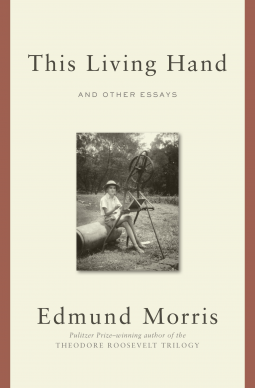
This Living Hand: And Other Essays
by Edmund Morris
This title was previously available on NetGalley and is now archived.
Send NetGalley books directly to your Kindle or Kindle app
1
To read on a Kindle or Kindle app, please add kindle@netgalley.com as an approved email address to receive files in your Amazon account. Click here for step-by-step instructions.
2
Also find your Kindle email address within your Amazon account, and enter it here.
Pub Date Oct 23 2012 | Archive Date Nov 27 2012
Random House Publishing Group - Random House | Random House
Description
When
the multitalented biographer Edmund Morris (who writes with equal virtuosity
about Theodore Roosevelt, Ronald Reagan, Beethoven, and Thomas Edison) was a
schoolboy in colonial Kenya, one of his teachers told him, “You have the most
precious gift of all—originality.” That quality is abundantly evident in this
selection of essays. They cover forty years in the life of a maverick
intellectual who can be, at whim, astonishingly provocative, self-mockingly
funny, and richly anecdotal. (The title essay, a tribute to Reagan in cognitive
decline, is poignant in the extreme.)
Whether Morris is analyzing images of Barack Obama or the prose style of
President Clinton, or exploring the riches of the New York Public Library Dance
Collection, or interviewing the novelist Nadine Gordimer, or proposing a
hilarious “Diet for the Musically Obese,” a continuous cross-fertilization is
going on in his mind. It mixes the cultural pollens of Africa, Britain, and the
United States, and propogates hybrid flowers—some fragrant, some strange,
some a shock to conventional sensibilities.
Repeatedly in This Living Hand, Morris celebrates the physicality of
artistic labor, and laments the glass screen that today’s e-devices interpose
between inspiration and execution. No presidential biographer has ever had so
literary a “take” on his subjects: he discerns powers of poetic perception even
in the obsessively scientific Edison. Nor do most writers on music have the
verbal facility to articulate, as Morris does, what it is about certain sounds
that soothe the savage breast. His essay on the pathology of Beethoven’s
deafness breaks new ground in suggesting that tinnitus may explain some of the
weird aural effects in that composer’s works. Masterly monographs on the art of
biography, South Africa in the last days of apartheid, the romance of the
piano, and the role of imagination in nonfiction are juxtaposed with
enchanting, almost unclassifiable pieces such as “The Bumstitch: Lament for a
Forgotten Fruit” (Morris suspects it may have grown in the Garden of Eden);
“The Anticapitalist Conspiracy: A Warning” (an assault on The Chicago Manual
of Style); “Nuages Gris: Colors in Music, Literature, and Art”; and the
uproarious “Which Way Does Sir Dress?”, about ordering a suit from the most
expensive tailor in London.
Uniquely illustrated with images that the author describes as indispensable to
his creative process, This Living Hand is packed with biographical
insights into such famous personalities as Daniel Defoe, Henry Adams, Mark
Twain, Evelyn Waugh, Truman Capote, Glenn Gould, Jasper Johns, W. G.
Sebald, and Winnie the Pooh—not to mention a gallery of forgotten figures whom
Morris lovingly restores to “life.” Among these are the pianist Ferruccio
Busoni, the poet Edwin Arlington Robinson, the novelist James Gould Cozzens,
and sixteen so-called “Undistinguished Americans,” contributors to an anthology
of anonymous memoirs published in 1902.
Reviewing that book for The New Yorker, Morris notes that even the most
unlettered persons have, on occasion, “power to send forth surprise flashes,
illuminating not only the dark around them but also more sophisticated
shadows—for example, those cast by public figures who will not admit to private
failings, or by philosophers too cerebral to state a plain truth.” The author
of This Living Hand is not an ordinary person, but he too sends forth
surprise flashes, never more dazzlingly than in his final essay, “The Ivo
Pogorelich of Presidential Biography.”
Edmund Morris was born and educated in Kenya and went to college in South Africa. He worked as an advertising copywriter in London before immigrating to the United States in 1968. His biography The Rise of Theodore Roosevelt won the Pulitzer Prize and American Book Award in 1980. After spending several years as President Reagan’s authorized biographer, he published the national bestseller Dutch: A Memoir of Ronald Reagan in 1999. He has written extensively on travel and the arts for such publications as The New Yorker, The New York Times, and Harper’s Magazine. Edmund Morris lives in New York and Washington with his wife and fellow biographer, Sylvia Jukes Morris.
For hi-res covers and author photos, please visit: http://smartpublic.randomhouse.com/teams/
Available Editions
| EDITION | Other Format |
| ISBN | 9780812993127 |
| PRICE | $32.00 (USD) |



